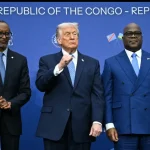In the vibrant landscape of Kenyan sports and entertainment, few moments capture the public imagination like a celebrity’s grand pledge to support our national teams. When Bahati stood before cameras during the CHAN 2024 tournament and promised Ksh 1 million to the Harambee Stars for a potential victory against Morocco, it created exactly the kind of viral moment that modern media thrives on. Social media buzzed with excitement, news outlets ran with the story, and for a brief moment, the worlds of music and football merged in a spectacular show of national pride. The pledge wasn’t just about money—it represented something much more profound: the idea that Kenya’s success in sports matters to everyone, from the dedicated fan in the stands to the celebrated artist on the stage.
However, as the initial excitement faded and the reality of the unfulfilled promise set in, what began as a story of national unity transformed into a cautionary tale about the responsibility that comes with public influence. The problem isn’t merely that a pledge went unfulfilled—it’s the dangerous precedent it sets for how we value promises in the public sphere. When Farouk Shikalo finally broke his silence months later, his frustration wasn’t just about the missing money. His accusation of “clout chasing” struck at the heart of a growing concern in our digital age: are public figures using meaningful moments and causes as mere content opportunities rather than genuine commitments?
The impact of such broken promises extends far beyond the financial aspect. For athletes like Shikalo and his teammates, who dedicate their lives to representing Kenya on the international stage, such experiences can create lasting cynicism. When public support transforms into what feels like a publicity stunt, it undermines the very morale and spirit it purports to boost. These athletes aren’t just playing for paychecks—they’re playing for national pride, and when that pride is commodified for social media engagement without follow-through, it represents a deeper betrayal of trust.
Bahati’s subsequent response—including his dismissal of Ksh 1 million as “small money”—only compounded the issue. Rather than addressing the core concern of accountability, this reaction highlighted a fundamental disconnect between the gesture and its meaning. The message it sent wasn’t one of support but of privilege—that such promises can be made lightly and abandoned without consequence. This attitude risks normalizing a culture where public figures can make grand gestures without any real intention of following through, treating serious commitments as disposable content in the endless chase for relevance.
The conversation sparked by this incident extends beyond football or entertainment. It touches on questions of integrity in public life, the responsibility that comes with influence, and the importance of aligning words with actions. In a country where sports heroes often struggle for recognition and support, such episodes risk damaging the fragile ecosystem of trust between athletes, fans, and public supporters. As we move forward, perhaps the lesson is clear: true support doesn’t need viral moments or grand gestures. It requires consistency, honesty, and the understanding that when you make a promise publicly, you’re not just making it to individuals—you’re making it to the nation. And in Kenya, we remember both the promises made and the promises broken.










